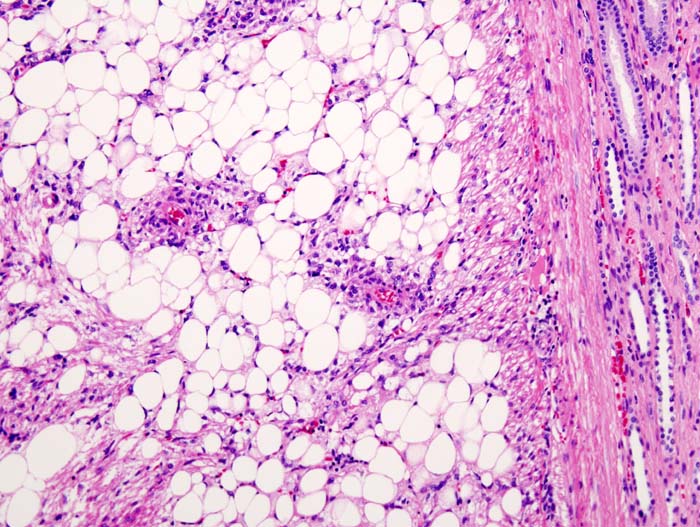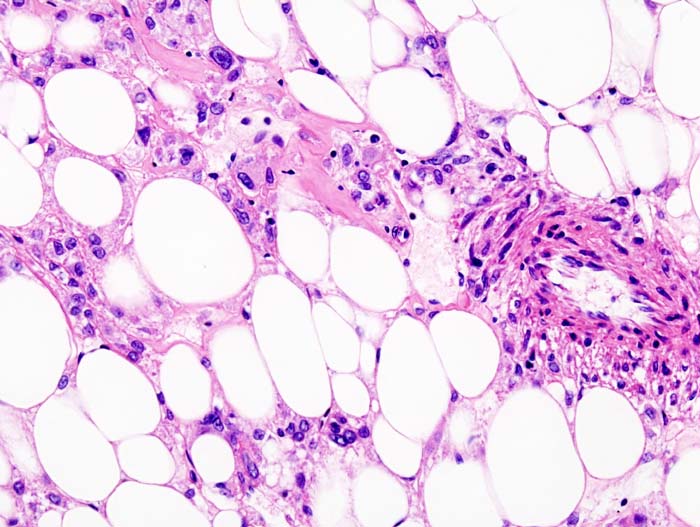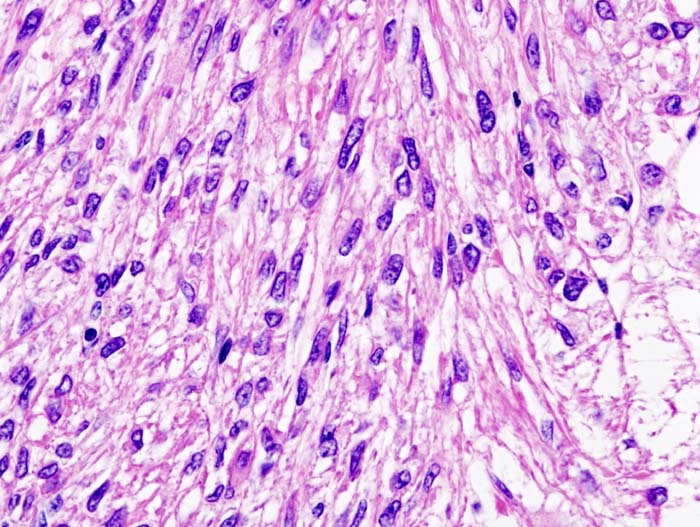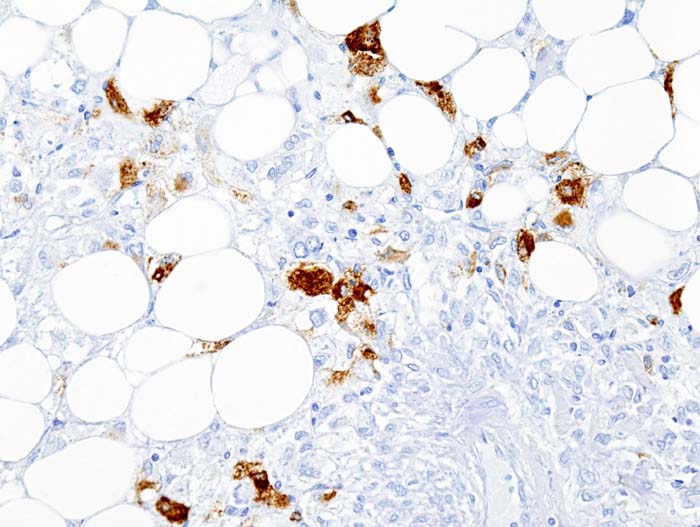Angiomyolipoma pathophysiology: Difference between revisions
No edit summary |
No edit summary |
||
| Line 22: | Line 22: | ||
[[Image:Renal angiomyolipoma (1).jpg|thumb|left| | [[Image:Renal angiomyolipoma (1).jpg|thumb|left|200px|1. Histopathologic image of renal angiomyolipoma. Nephrectomy specimen. H & E stain.]] | ||
<br clear="left"/> | <br clear="left"/> | ||
[[Image:Renal angiomyolipoma (2).jpg|thumb|left| | [[Image:Renal angiomyolipoma (2).jpg|thumb|left|200px|2. Histopathologic image of renal angiomyolipoma. Nephrectomy specimen. The same case as demonstrated in "Image 1". H & E stain.]] | ||
<br clear="left"/> | <br clear="left"/> | ||
[[Image:Renal angiomyolipoma (3).jpg|thumb|left| | [[Image:Renal angiomyolipoma (3).jpg|thumb|left|200px|3. Histopathologic image of renal angiomyolipoma. Nephrectomy specimen. The same case as demonstrated in "Image 1". H & E stain.]] | ||
<br clear="left"/> | <br clear="left"/> | ||
[[Image:Renal angiomyolipoma (4) HMB-45 immunostain.JPG|thumb|left| | [[Image:Renal angiomyolipoma (4) HMB-45 immunostain.JPG|thumb|left|200px|4. Histopathologic image of renal angiomyolipoma. Nephrectomy specimen. The same case as demonstrated in "Image 1". HMB-45 immunostain.]] | ||
<br clear="left"/> | <br clear="left"/> | ||
===Cytologic=== | ===Cytologic=== | ||
Revision as of 21:00, 21 September 2015
|
Angiomyolipoma Microchapters |
|
Diagnosis |
|---|
|
Treatment |
|
Case Studies |
|
Angiomyolipoma pathophysiology On the Web |
|
American Roentgen Ray Society Images of Angiomyolipoma pathophysiology |
|
Risk calculators and risk factors for Angiomyolipoma pathophysiology |
Editor-In-Chief: C. Michael Gibson, M.S., M.D. [1] Associate Editor-In-Chief: Cafer Zorkun, M.D., Ph.D. [2], Faizan Sheraz, M.D. [3]
Overview
Pathophysiology
Gross
- Well circumscribed - uniform yellow.
Since all three components of an angiomyolipoma (vascular cells, immature smooth muscle cells and fat cells) contain a "second hit" mutation, they are believed to have derived from a common progenitor cell that suffered the common second hit mutation. Angiomyolipomas are members of the perivascular epithelioid cells tumour group (PEComas) and are composed of variable amounts of three components;blood vessels (-angio), plump spindle cells (-myo) and adipose tissue (-lipo). Almost all classic angiomyolipomas are benign but they do have the risk of rupture with bleeding or secondary damage/destruction of surrounding structures as they grow.
Variants
There is a special variant called an epithelioid angiomyolipoma, composed of more plump, epithelial looking cells, often with nuclear atypia, that have a described risk of malignant behaviour. This variant, unlike conventional AMLs, may mimic renal cell carcinoma.10 Metastases have also been described 9.
Microscopic Pathology
Microscopic
Features:
- Smooth muscle.
- Adipose tissue - not always present[1] - key feature.
- Abundant blood vessels.




Cytologic
Features[1]
- Nuclei - round/ovoid.
- Chromatin - bland.==IHC==
- Melanocytic markers +ve.[2]
- HMB-45 +ve in all cases (15/15).[3]
- Melan A +ve in ~87% of cases (13/15).
- Epithelial markers -ve[2], e.g. EMA and AE1/AE3.
- SMA +ve.
- CD117 +ve/-ve.
- Ki-67:[4]
- Epithelioid variant of AML +ve.
- Conventional AML -ve.
References
- ↑ 1.0 1.1 Crapanzano, JP. (2005). "Fine-needle aspiration of renal angiomyolipoma: cytological findings and diagnostic pitfalls in a series of five cases". Diagn Cytopathol. 32 (1): 53–7. doi:10.1002/dc.20179. PMID 15584043. Unknown parameter
|month=ignored (help) - ↑ 2.0 2.1 Template:Ref GUP
- ↑ Esheba, Gel S.; Esheba, Nel S. (2013). "Angiomyolipoma of the kidney: clinicopathological and immunohistochemical study". J Egypt Natl Canc Inst. 25 (3): 125–34. doi:10.1016/j.jnci.2013.05.002. PMID 23932749. Unknown parameter
|month=ignored (help) - ↑ Ooi, SM.; Vivian, JB.; Cohen, RJ. (2009). "The use of the Ki-67 marker in the pathological diagnosis of the epithelioid variant of renal angiomyolipoma". Int Urol Nephrol. 41 (3): 559–65. doi:10.1007/s11255-008-9473-1. PMID 18839327.